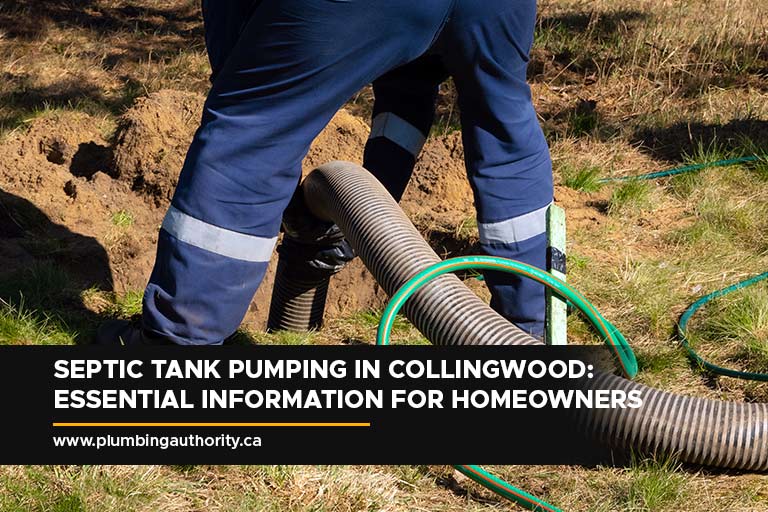
Homeownership in Collingwood comes with its unique set of responsibilities, among which maintaining a septic system is paramount. A well-functioning septic system is crucial for the health and comfort of your household, as well as the protection of the environment.
Septic tank pumping is often overlooked until problems arise. However, proactive maintenance can prevent costly repairs and ensure your home’s wastewater management system works efficiently. Understanding the significance of septic tank pumping, the indicators for when it’s necessary, and what the process involves can save homeowners time and money. Let’s delve into the essential information every Collingwood homeowner needs to know about septic tank pumping.
Why Do You Need Septic Tank Pumping?
Regular septic tank pumping is crucial for several reasons, each contributing to the longevity and efficiency of your septic system.
- Prevents Overflows: Without regular pumping, septic tanks accumulate solids, risking overflow. Such overflows create unsanitary conditions, endanger health, and impact the environment negatively, emphasizing the importance of consistent septic system maintenance.
- Protects Soil Absorption Field: Regular septic tank pumping is crucial for preventing the clogging of the soil absorption field with solids. A clogged field can cease to function, potentially leading to complete system failure and necessitating costly repairs or even full replacement.
- Avoids Backups: Ensuring your septic tank is pumped regularly mitigates the risk of sewage backups into your home, a situation that arises when tanks are overloaded and can no longer efficiently process waste. This maintenance task is key to avoiding such disruptive and unpleasant incidents.
- Extends System Life: Regular septic tank maintenance, including periodic pumping, safeguards against system overloads, backups, and soil field damage, substantially extending the lifespan of the septic system and protecting your investment from early replacement costs.
- Improves Efficiency: A septic tank that receives regular pumping services operates with heightened efficiency. This maintenance routine ensures effective waste processing and optimal system flow, maintaining the system’s overall health and functionality.
- Environmental Protection: Pumping your septic tank regularly prevents the release of untreated sewage into the environment, a critical measure for safeguarding local water bodies and wildlife. This practice demonstrates a commitment to environmental stewardship and public health.
- Compliance with Regulations: Adhering to local laws, many regions, including Collingwood, mandate periodic septic tank pumping to maintain public health and safety. This requirement underscores the critical role of regular maintenance in preventing system failures and environmental contamination.
- Cost Savings: While there is a fee for septic tank pumping, the expense is markedly lower than the costs associated with repairing or replacing a failed system. Investing in routine maintenance ultimately yields significant long-term savings by avoiding more severe financial burdens.
How Often Should You Pump Your Septic Tank in Collingwood?

Pumping frequency depends on the size of your septic tank
Determining the right frequency for septic tank pumping depends on several factors unique to each household.
- Household Size: A larger family size correlates to increased wastewater production, necessitating more frequent septic tank pumping to manage the volume and prevent system overload. Smaller families benefit from less frequent maintenance requirements.
- Septic Tank Size: The physical size of a septic tank determines its maintenance schedule. Bigger tanks have a higher capacity for waste, allowing longer intervals between pumping compared to smaller tanks that fill up faster.
- Amount of Wastewater Generated: High water usage in households accelerates the rate at which septic tanks reach capacity. Adopting water-saving practices can significantly delay the need for septic tank pumping, making conservation beneficial.
- Solid Waste Disposal: The frequency of septic tank pumping is influenced by the volume of solid waste entering the system. Reducing garbage disposal use and avoiding flushing non-degradable items can lessen maintenance needs.
- System Age and Condition: The efficiency of older or poorly maintained septic systems declines over time, necessitating more frequent pumping to uphold system health and prevent potential failures that could lead to costly repairs.
The Septic Tank Pumping Process

Understanding what to expect during the septic tank pumping process can help homeowners prepare and ensure the procedure goes smoothly.
- Inspection and Access: The procedure begins with professionals conducting a thorough examination of the septic system and identifying tank access points. This crucial step ensures that the pumping process can be conducted efficiently, effectively, and without any unforeseen complications, setting the stage for a smooth maintenance operation.
- Pumping: The crucial phase involves using a vacuum truck to remove all solids and liquids from the septic tank, ensuring its capacity is restored, system efficiency is maintained, and potential backups and overflows are prevented.
- Visual Inspection: After emptying the tank, a thorough visual inspection is conducted to detect any signs of damage or wear, enabling early diagnosis and timely repairs to extend the septic system’s lifespan, thus ensuring its optimal functioning.
- Filter Cleaning: The pumping service involves cleaning or replacing septic tank filters, ensuring unobstructed flow and effective filtration, to maintain the system’s proper and efficient functioning, based on their condition, and ensuring proper and efficient septic system operation.
- Reporting: Following a pumping service, homeowners receive a detailed report detailing their septic tank’s condition, any inspection-related issues, and recommended maintenance or repair actions. This report aids in understanding the septic system’s health and preparing for necessary interventions.
- Frequency Recommendations: Professionals inspect and assess a septic system, providing personalized recommendations for optimal septic tank pumping frequency. This helps homeowners maintain system health and prevents issues from overuse or neglect.
- Maintenance Advice: Technicians offer homeowners practical advice on septic system maintenance, including water conservation, proper waste disposal, and other habits to prevent common issues and ensure efficient operation during service appointments.
- Environmental Considerations: The process is conducted with a strong commitment to environmental protection, ensuring responsible disposal of waste from the septic tank, following local regulations, to protect the surrounding ecosystem.
Regular septic tank pumping is a critical component of home maintenance for Collingwood residents with septic systems. By understanding the reasons for pumping, how often it should be done, and what the process involves, homeowners can ensure their system remains functional and efficient for years to come. Proactive maintenance not only saves money on repairs and replacement but also protects your family’s health and the environment.
For expert septic tank pumping services in Collingwood, contact Plumbing Authority at (647) 992-7473. Our team of professionals is ready to assist with all your septic system needs, ensuring your home remains a safe and comfortable place for your family.




